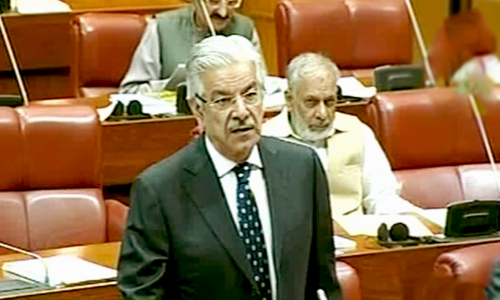Khawaja Asif hints at foreign policy shift from US towards China, Russia
Foreign Minister Khawaja Asif on Tuesday said Pakistan's foreign policy has for long remained US-centric, however, the time had come to review the policy and shift its focus towards Russia and China.
The foreign minister highlighted the possibility of a policy shift and said revisiting the Islamabad's policy was the need of the hour. The minister hinted at an inclination towards the left block of the world, saying "China lives next to us and we have a common wall. Russia can also be our good friend."
Asif said this while addressing a seminar hosted by the Sustainable Development Policy Institute (SDPI) in the federal capital.
"We can’t have an independent foreign policy until we are economically strong," the minister maintained.
Asif said the US has been Pakistan's biggest trade partner. "We have to convert our diplomatic outpost to trade outpost," he said, adding that Islamabad must improve and correct its relationships.
Peace in Afghanistan is extremely important for us, he said, adding that the US will have to see relations with Islamabad without the prism of Afghanistan. "We [Pakistan and the US] have a historic and robust relationship."
Further talking about Afghanistan, the minister said Islamabad wants to live peacefully with all its neighbours and rest of the world. "We want peace in Afghanistan. The Afghan war was a liability for Pakistan. We are still suffering very badly from the Afghan war," he added.
The minister, however, expressed hope and said: "We are trying to manage the situation and to turn the debris into hope." He elaborated that the debris includes religious radicalism and said the nation was facing its consequences.
"There is no end in sight," he said, adding that despite past mistakes the country was moving on. "We are looking for peace and harmonisation in the region," he maintained.
Some of our neighbours had expressed reservations on the China-Pakistan Economic Corridor (CPEC) but we have a different perspective as we do believe that its a game changer project for the entire region, Asif added.
"We avoid conflict and maintain a policy of neutrality in relations with Iran and the Kingdom of Saudi Arabia."
We share a long border with Iran and we have a common wall, culture, and language with Afghanistan, the minister said, but deplored the fact that Pakistan was "facing terrorism from the eastern and western borders".
We have direct and more stakes in Afghanistan's peace than any other country, he maintained.
We will also have to put our house in order, he said while referring to the Faizabad interchange sit-in. "It was not a good example," Asif accepted.














































